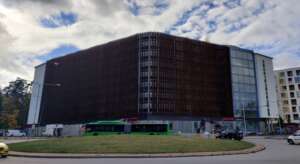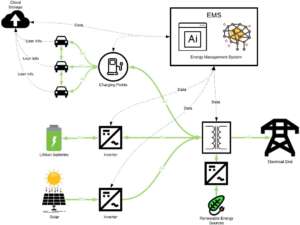Smart Grid

Figur 1: The mobility house Dansmästaren in Uppsala Rosendal – a testbed for flexible vehicle charging and EMS-development.
Background
One of the largest challenges of today’s society is how to guarantee the power and energy demand in the future in a safe, efficient and sustainable way. One of the key issues for this is to have a reliable and efficient power system at all levels. In the next coming years, we will both see a shift in electricity production consisting of more renewable sources at the same time as different forecasts predicts a significant increase in electricity use.
The research within the area is focused on studying different aspects of the power system, such as operation of microgrids, flexibility and need of energy storage, variability, reliability, control and operation of different components etc. Both the power system and different key components are studied. Moreover, the power from a renewable energy system will vary depending on the source and the system layout. The knowledge about these variations and how to plan for implementing more power from renewables is important for the function and control for the future grid.
The use of power electronics in the grid has, and will continue to, increase rapidly. Their control, reliability, efficiency and choice of material in the semiconductor is of great interest for future studies. Another important area is what to measure in the power system and to show how these measurements can be used to make the power system more efficient and reliable. Digitalization and machine learning will become two important areas in the future smart grid.
Aims
Our goals are to develop sustainable and efficient power system solutions for the grid and for the production and consumption.
Approaches
We are attempting to approach all our projects from a holistic perspective and the process ideally (when possible) includes; background analysis of the area, analytical calculations and simulations, laboratory experiments and full-scale experiments. The research within smart grid at Uppsala University is divided into several areas: power system analysis, power systems to renewable energy, implementation of renewable energy to the power system (power variability, renewable energy system modelling), electromobility and the power system, power converter topology and control, and diamond electronics.
Keywords
Power system analysis and control, renewable energy power systems, power electronics, converter topologies and control, variability analysis, renewable energy integration, reliability analysis and diagnostics, use and need of energy stroage, felexibility, electrocmobility, diamond electronics.
Links
Link to the electricity section at the Faculty of Science and Technology.
Link to the Swedish Centre for Smart Grids and Energy Storage, KTH
Project leaders
Prof. Jan Isberg
Prof. Urban Lundin
Prof. Rafael Waters
Prof. Hans Bernhoff
Doc. Cecilia Boström
Doc. Irina Temiz
Doc. Karin Thomas
Dr. Mikael Bergkvist
Other project members
Doc. Saman Majdi
Dr. Johan Forslund,
Dr. Markus Gabrysch,
Dr. Janaina Goncalves de Oliveira,
Dr. Olle Svensson
Dr. Nattakarn Sundtornwipat,
Doktorand Aisuluu Aitkulova
Doktorand Vinicius Albuquerque
Doktorand Sara Anttila
Doktorand Viktor Djurberg
Doktorand Jessica Döhler
Doktorand Carl Flygare
Doktorand Samuel Forsberg
Doktorand Johannes Hjalmarssom
Doktorand Tatiana Potapenko
Doktorand Alexander Wallberg
Department of Engineering Sciences, Division of Electricity, Uppsala University
Additional funding (apart from StandUp for Energy)
Swedish Energy Agency
Vetenskapsrådet
Vinnova
Åforsk
J. Gust Ritchers
Carl Tryggers stiftelse
Centre of Natural Hazards and Disaster Science (CNDS)
Vattenfall AB
E.ON
SvK
SweGRIDS
Swedish Electromobility Center
Interreg North Sea Region

